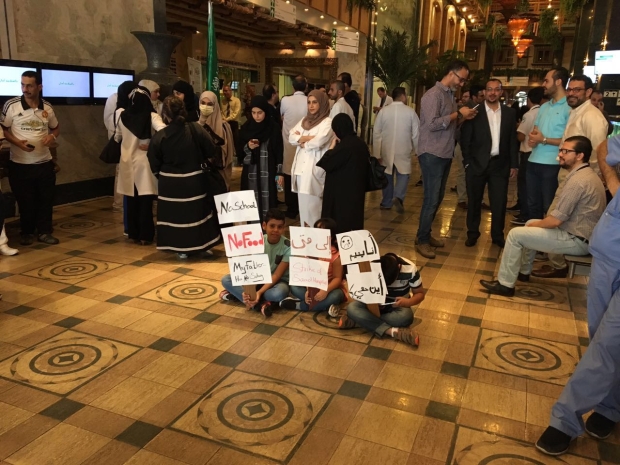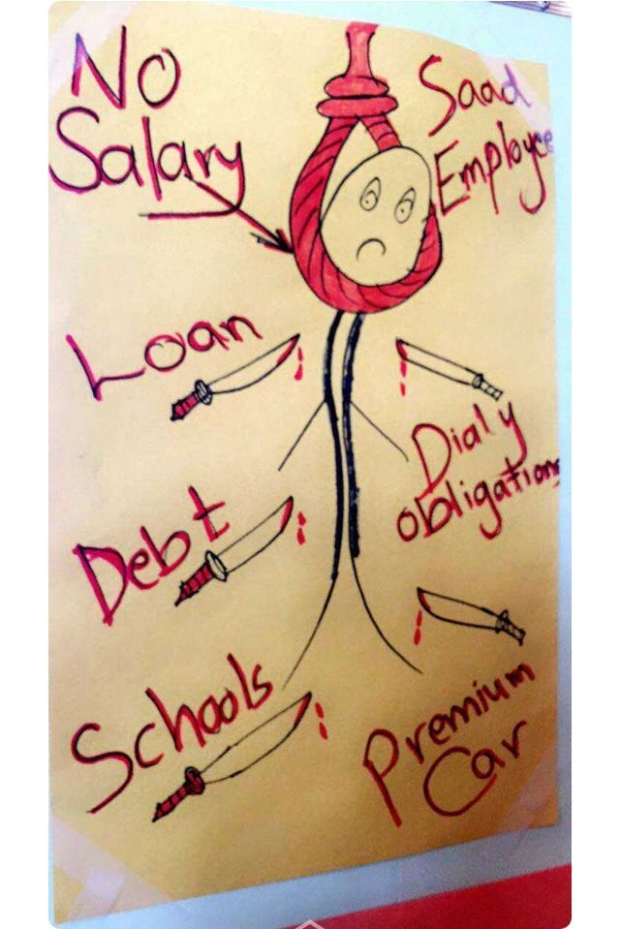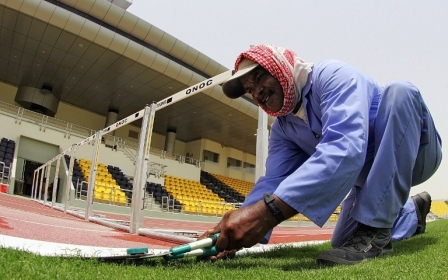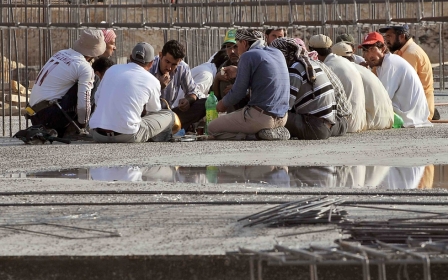Saudi and foreign workers unite to strike over unpaid wages
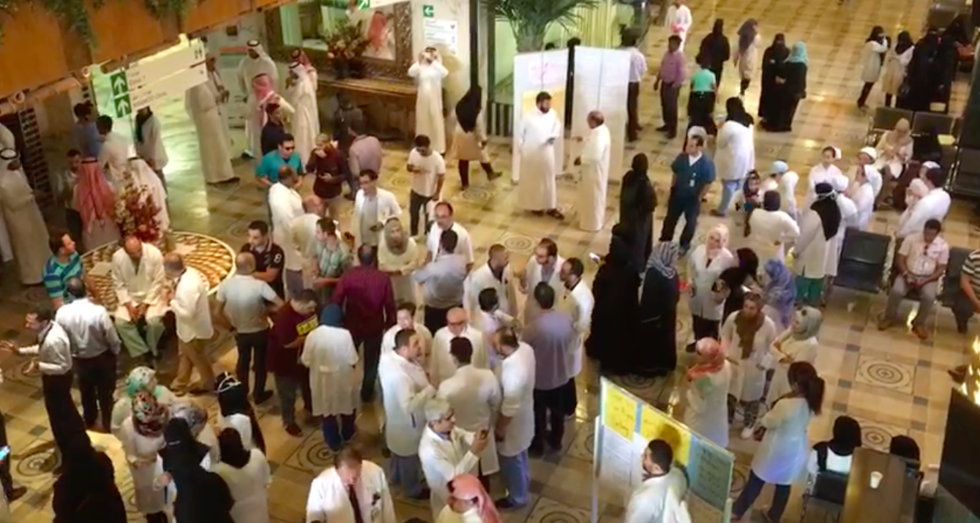
Staff at a prestigious private hospital in Saudi Arabia entered the fourth day of an open-ended strike on Wednesday in protest over wages not being paid for almost four months.
Two doctors, one American and the other British, and two nurses, one Saudi and the other Jordanian, told MEE more than 1,200 staff at Saad Specialist Hospital in the eastern city of Khobar have not been paid since May.
Despite trade union activity being strictly banned in Saudi Arabia the staff have organised an ongoing strike that began on Sunday which they said would only end once all workers were paid what they were owed.
“It’s a pay up or we’re not going back to work situation,” the American doctor said on condition of anonymity, fearing they would be sacked for speaking out. “Initially people were concerned about striking. But once they reached their breaking point they stopped caring. So far there hasn’t been any issue [with authorities over the strike].”
Strikes in Saudi Arabia are rare but the hospital strike is even more notable as both Saudi and foreign employees have worked together to protest the unpaid salaries.
“It’s very unusual for Saudis not to be paid,” the British doctor said on condition of anonymity. “I have been here six years and it’s the first time I have heard of it.
United action
“Surgeons, management, doctors, nurses, admin - Westerners, Asians, and Saudis are all taking action together. It’s actually remarkable if you consider taking photos without someone’s permission in Saudi carries a prison sentence and public shows of dissatisfaction carry a public beating and jail.”
The Jordanian nurse said there is no one single leader of the strike, and that they have worked collaboratively by using messaging applications and social media websites.
“We have organised by using groups of WhatsApp, Twitter, and Facebook,” she said. “All of us talked together and decided to go on strike.”
Hospital employees’ children staged a sit-in at the hospital on Wednesday, blocking the entrance while holding signs that said they were not able to eat or go to school because their parents were not being paid.
Striking staff members gathered in the hospital’s lavish clinic, where sparkling chandeliers are worth more than a month’s salary for a whole ward of nurses, the British doctor said.
Security was called in to pull down posters put up by staff detailing the pressures of not being paid, including debt, having no car, and an inability to send children to school.
The hospital is part of the Saad Group which is owned by Saudi billionaire Maan al-Sanea. On its website the Saad Group says it runs “diversified businesses” in the Gulf and has investments around the world.
Saudi Arabia is in the midst of a financial crisis that has seen high-profile construction companies including Saudi Oger and the Bin Ladin Group unable to pay tens of thousands of workers for periods of up to two years.
The construction crisis has been blamed on the government not paying contractors but Saad Specialist Hospital staff alleged corruption, rather than cash flow, is the problem.
“They (the management) said there is a financial issue but we know there is money coming in,” the Jordanian nurse said on condition of anonymity. “This hospital is one of the most expensive in the world - they take in more than one million riyals ($266,600) a day.
'Where has the money gone?'
“Where has all this money gone?”
No one from the Saad Group responded to requests for comment on why the hospital is not paying their staff, but rumours are rife among those on strike.
“We think the owner is taking 600,000 riyals ($160,000) a day in cash out of the hospital,” the American doctor said.
The doctor added that private health insurance company Bupa last month paid the hospital 13 million riyals ($3.7 million), but none of that money was paid out in staff salaries.
“The cash just kind of disappears. Nobody is really sure why there is an issue.”
The Saudi nurse estimated that the hospital’s monthly wage bill is upwards of eight million riyals ($2.13 million).
Eight hundred staff members have signed a petition calling for the government to intervene, which has been sent to King Salman.
Whilst the four staff members complained that the labour ministry has not done enough to help, on Wednesday a group of doctors and nurses went to meet with an aide to provincial governor Prince Saud bin Nayef and received a surprising response.
“Keep striking,” the prince’s aide said, according to the American doctor who was present. “Don’t do more, don’t do less - we’re working on a solution.”
The doctor added that this was a “ground breaking” response for Saudi Arabia given the official ban on all strikes. The prince’s aide also called in the owner’s son and told him the situation cannot continue.
King 'keen to solve dispute'
An official source told MEE on condition of anonymity that King Salman is keen to see the situation resolved swiftly, while ensuring the hospital continues to operate.
The British doctor said the company’s owner has been given three options to resolve the situation: he either fixes the problem, partners with another Saudi billionaire, or the government takes over the hospital.
However, while moves are made to resolve the situation, living conditions for foreign workers have steadily got worse.
The hospital’s problems first began last June when staff were paid 50 percent of their monthly salary. In October they were again paid half of what they were owed, raising workers' suspicions that the issue was serious.
Housing and travel allowances were taken away, leaving foreign workers with no choice but to move into company-owned compounds, where maintenance workers have been on strike for several months over unpaid wages.
The conditions in the compounds are poor, said the British doctor, who sent MEE photos of rubbish strewn around an overgrown complex in which a school is locked up leaving children with no access to education.
Living like prisoners
Women living in the compound cannot leave, because with no travel allowance, they can’t pay for a man to drive them, as Saudi authorities do not allow women to drive.
But it is the maintenance workers - mostly from south Asian countries - who have suffered the most.
“The Bangladeshi, Indian, and Pakistani workers live like prisoners,” said the British doctor. “They get by on food parcels from their embassies who also give them healthcare visits.
“There has been violence against the workers but authorities have consistently taken the side of the owners.”
The Western expatriates have tried to contact their embassies but officials said they arein no position to offer practical help.
Western consulates 'can do nothing'
The number of Western staff has dropped in recent years, the American doctor said, but there are still staff from the United States, Britain, Ireland, and South Africa.
The American consulate has said “legally there is nothing they can do”.
“They can try to put some pressure on the owner but anytime anyone has tried that before it has backfired and made the situation worse,” the American doctor said.
The company has renewed work permits for staff critical to the hospital’s operation, but nurses and other employees are living in a perilous situation with expired permits, which has left them open to being arrested and deported.
The Jordanian nurse said it has been “really difficult” for her family in her home country, as they get by on the money she has sent home from Saudi Arabia.
She said foreign staff are in an impossible position because they cannot leave the hospital and return home.
Arrears piling up
“If we resign we will get nothing,” she said. “They will force us to stay with no money and if we want to leave we would have to sign exit papers saying we have received all our money when we have received nothing.”
When a foreign worker in Saudi Arabia leaves the kingdom they must sign documents declaring they have received all money due to them, which means many poor individuals end up trying to stay and fight to receive their unpaid wages.
“Most people who have worked here for 10 or more years can’t afford to walk away from four months salary plus their end of service benefits,” the American doctor said. “If you stay for 10 years you’re entitled to an extra seven and a half months salary and for every year [over 10 years service] you are entitled to another month bonus.
“There is a supervisor here who is owed 16 and a half months salary for being here 19 years.”
The Saudi nurse said she has suffered from a loss of wages, having to sell a car and belongings, but she explained that at least she has her family close by who she now lives with.
“They (the foreign workers) do not have enough money for their children to pay for their food or take them to school,” she said. “I am Saudi and I live with my family but what about the foreign staff?”
Most of the foreign staff who work in the hospital come from other Arab countries, including Egypt, Jordan, and Lebanon.
All the staff members said they were committed to caring for patients who are already in the hospital and who require urgent and ongoing medical care, but new patients are being encouraged to look to other clinics for treatment.
“We still have our humanity but this will disappear if we are not paid,” the Saudi nurse said. “We cannot provide high quality care in this kind of situation.”
She added that the owner has repeatedly refused to speak to staff - and that he has instead sent a British accountant to speak on his behalf.
“This British man just came to tell us that if we don’t work the hospital won’t have any income so we won’t get the money we are owed,” she said.
“We want the world to know our situation because we tried to tell people here but they showed us that they don’t care - especially the owner.”
Middle East Eye propose une couverture et une analyse indépendantes et incomparables du Moyen-Orient, de l’Afrique du Nord et d’autres régions du monde. Pour en savoir plus sur la reprise de ce contenu et les frais qui s’appliquent, veuillez remplir ce formulaire [en anglais]. Pour en savoir plus sur MEE, cliquez ici [en anglais].


